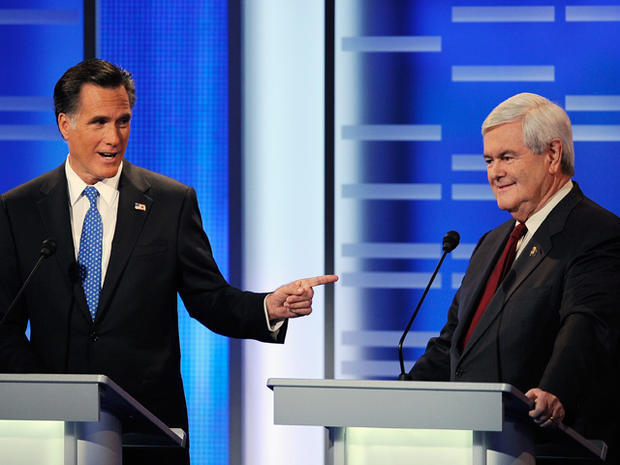Romney, Gingrich battle could drag for months
The much-hyped Iowa caucuses are just a few weeks away, but that doesn't mean you should expect the fight for the Republican presidential nomination to be over anytime soon.
Consider some simple math. Between the four states where there will be primaries and caucuses in January, only 115 delegates will be decided: 28 in Iowa (January 3), 12 in New Hampshire (January 10), 25 in South Carolina (January 21) and 50 in Florida (January 31).
There are a total of 2,285 delegates available - nearly 20 times as many delegates as will be allocated in January. In Texas alone - where the primacy is currently set for March, though it could be moved back - there are 155 delegates to be had. And there are more delegates to be had in June - 405 - than the 311 there are to be had in January and February combined.
That doesn't mean that the early states aren't important - the momentum that a candidate can earn from winning both New Hampshire and Iowa, which translates into a flood of fundraising and positive media coverage, can be enough to propel him or her the nomination. But it does mean that we should keep those contests in perspective.
There's another important factor to consider as well. New rules adopted by Republicans mandate that delegates awarded before April 1 be distributed on a proportional basis, which will make it harder for a frontrunner to deliver a knockout blow with winner-take-all victories in the early states. A candidate who wins just 15 percent of the vote in a state will be able to add to his or her delegate count.
It's a situation that has Mitt Romney settling in for a long slog to the nomination.
"I'd like to close real early but my experience is, particularly with delegates being awarded on a proportional basis, why who knows how long it could go?" he said this week. "We're prepared to go on a nice, long, successful campaign."
That followed comments in Arizona last week, where Romney predicted "[t]his will probably take longer than a week or two to sort out."
"My expectation is that this is going to be a campaign that's going to go on for a while, and I expect to win it," he added.
Romney is currently better positioned for a drawn-out fight than his main rival for the nomination, Newt Gingrich, who is struggling to close the gap on Romney when it comes to fundraising and organization. (The risks of Gingrich's last minute push were illustrated Tuesday when his new Iowa political director was forced out for suggesting evangelicals are ready to help God "expose the cult of Mormon.")
But Gingrich is currently leading in the polls, and he could easily leverage momentum from early state victories into the resources he needs to battle Romney into March and beyond. (Funding Gingrich during this period will be both direct donations to his campaign and the two SuperPACs that are supporting him, which can spend unlimited money on his behalf.) In addition, Ron Paul is poised to leverage the generosity of his passionate supporters to stay in the contest for the long haul, building up delegates and complicating the frontrunners' efforts to put each other away.
It's unclear whether a long primary battle will ultimately help or hurt the Republican nominee. President Obama's re-election team has been arguing that it will be damaging, because it will force the candidates to play to the right in a way that will alienate moderate voters. Senior Obama campaign strategist David Axelrod told reporters this week that "the longer this race goes, the more you are going to see these Republican candidates mortgage their general election campaign to win the nomination."
Yet there is a case to be made that a long fight could help the eventual nominee -- with perhaps the best piece of evidence being Mr. Obama's long battle for the 2008 Democratic nomination against Hillary Clinton.
It's certainly true a long primary fight would mean that Republican candidates spend the spring focused on each other, not Mr. Obama, potentially inflicting significant damage on each other while the president sharpens his message and campaign operation. But a long primary fight also focuses media attention on the candidates, gets primary voters engaged, and allows them to go through the difficult skirmishes that make them a better candidate in the long run. It also can translate into a significant uptick in voters registering with the party in order to cast ballots, which could pay significant dividends in a general election.
And particularly for the unpredictable Gingrich - who many Republicans fear will self-destruct on the campaign trail due to his penchant for off-the-cuff comments - a long primary fight is an opportunity to put to rest fears that he would be a disastrous general election candidate. Indeed, Republicans may well be far more comfortable with Gingrich as their nominee if he proves himself over a course of months against Romney instead of wrapping up the nomination in the early states.
Special report: Election 2012